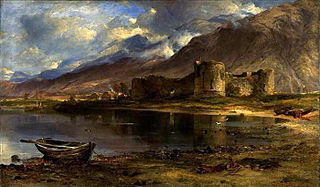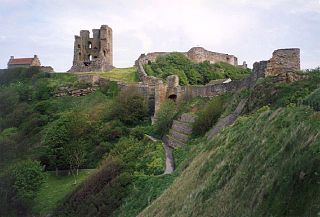Related Research Articles

1650 (MDCL) was a common year starting on Saturday of the Gregorian calendar and a common year starting on Tuesday of the Julian calendar, the 1650th year of the Common Era (CE) and Anno Domini (AD) designations, the 650th year of the 2nd millennium, the 50th year of the 17th century, and the 1st year of the 1650s decade. As of the start of 1650, the Gregorian calendar was 10 days ahead of the Julian calendar, which remained in localized use until 1923.

1645 (MDCXLV) was a common year starting on Sunday of the Gregorian calendar and a common year starting on Wednesday of the Julian calendar, the 1645th year of the Common Era (CE) and Anno Domini (AD) designations, the 645th year of the 2nd millennium, the 45th year of the 17th century, and the 6th year of the 1640s decade. As of the start of 1645, the Gregorian calendar was 10 days ahead of the Julian calendar, which remained in localized use until 1923.

George Monck, 1st Duke of Albemarle KG PC JP was an English soldier, who fought on both sides during the Wars of the Three Kingdoms. A prominent military figure under the Commonwealth, his support was crucial to the Restoration of Charles II in 1660, who rewarded him with the title Duke of Albemarle and other senior positions.

The Rump Parliament was the English Parliament after Colonel Thomas Pride had commanded his soldiers, on 6 December 1648, to purge the Long Parliament of members against the Grandees' intention to try King Charles I for high treason.

The Irish Confederate Wars, also called the Eleven Years' War, took place in Ireland between 1641 and 1653. It was the Irish theatre of the Wars of the Three Kingdoms, a series of civil wars in the kingdoms of Ireland, England and Scotland – all ruled by Charles I. The conflict had political, religious and ethnic aspects and was fought over governance, land ownership, religious freedom and religious discrimination. The main issues were whether Irish Catholics or British Protestants held most political power and owned most of the land, and whether Ireland would be a self-governing kingdom under Charles I or subordinate to the parliament in England. It was the most destructive conflict in Irish history and caused 200,000–600,000 deaths from fighting as well as war-related famine and disease.

The Wars of the Three Kingdoms, sometimes known as the British Civil Wars, were a series of intertwined conflicts fought between 1639 and 1653 in the kingdoms of England, Scotland and Ireland, then separate entities united in a personal union under Charles I. They include the 1639 to 1640 Bishops' Wars, the First and Second English Civil Wars, the Irish Confederate Wars, the Cromwellian conquest of Ireland and the Anglo-Scottish War of 1650–1652. They resulted in victory for the Parliamentarian army, the execution of Charles I, the abolition of monarchy, and founding of the Commonwealth of England, later The Protectorate, a unitary state which controlled the British Isles until the Stuart Restoration in 1660.

The Battle of Dunbar was fought between the English New Model Army, under Oliver Cromwell, and a Scottish army commanded by David Leslie on 3 September 1650 near Dunbar, Scotland. The battle resulted in a decisive victory for the English. It was the first major battle of the 1650 invasion of Scotland, which was triggered by Scotland's acceptance of Charles II as king of Britain after the beheading of his father, Charles I on 30 January 1649.

The Anglo-Scottish war (1650–1652), also known as the Third Civil War, was the final conflict in the Wars of the Three Kingdoms, a series of armed conflicts and political machinations between shifting alliances of religious and political factions in England, Scotland and Ireland.

The Cromwellian conquest of Ireland (1649–1653) was the re-conquest of Ireland by the Commonwealth of England, led by Oliver Cromwell. It forms part of the 1641 to 1652 Irish Confederate Wars, and wider 1639 to 1653 Wars of the Three Kingdoms. Modern estimates suggest that during this period, Ireland experienced a demographic loss totalling around 15 to 20% of the pre-1641 population, due to fighting, famine and bubonic plague.

Between 1639 and 1652, Scotland was involved in the Wars of the Three Kingdoms, a series of conflicts which included the Bishops' Wars, the Irish Rebellion of 1641, the English Civil War, the Irish Confederate Wars and finally the conquest of Ireland and Scotland by the Parliamentarian New Model Army.

The Battle of Inverkeithing was fought on 20 July 1651 between an English army under John Lambert and a Scottish army led by James Holborne as part of an English invasion of Scotland. The battle was fought near the isthmus of the Ferry Peninsula, to the south of Inverkeithing, after which it is named.
The Battle of Hieton was fought on the 1 December 1650 between a force of Scottish Remonstrants under Colonel Gilbert Ker and 1,000 English commanded by Major-general John Lambert. The site of the battle was by the Cadzow Burn, near the present day town centre of Hamilton, Scotland. The Scots attacked, surprising the English, but were beaten back and destroyed as a fighting force. The battle was part of the Anglo-Scottish war of 1650–1652.
Events from the year 1661 in England.
Nationality words link to articles with information on the nation's poetry or literature.
Events from the year 1640 in England.
Events from the year 1647 in England.
Events from the year 1650 in Ireland.

James Berry, died 9 May 1691, was a Clerk from the West Midlands who served with the Parliamentarian army in the Wars of the Three Kingdoms. Characterised by a contemporary and friend as "one of Cromwell's favourites", during the 1655 to 1657 Rule of the Major-Generals, he was administrator for Herefordshire, Worcestershire, Shropshire and Wales.
Events from the 1650s in the Kingdom of Scotland.

The siege of Dundee, 23 August to 1 September 1651, took place during the 1650 to 1652 Anglo-Scottish war. After a two-day artillery bombardment, a Covenanter garrison under Robert Lumsden surrendered to Commonwealth of England forces commanded by George Monck.
References
- 1 2 Lay, Paul (2021) [2020]. Providence Lost. London: Head of Zeus. p. 176. ISBN 9781781853368.
- ↑ Kenyon, J. P. (1969). "The Interregnum, 1649–1660". In Kenyon, J. P. (ed.). The Stuart Constitution. Cambridge University Press. p. 330.
- ↑ Weinstein, Jeremy D. (1986). "Adultery, Law and the State: A History". Hastings Law Journal. 38 (1): 195–238.
- 1 2 "1650, British Civil Wars". Archived from the original on 12 October 2007. Retrieved 2007-09-19.
- ↑ Williams, Hywel (2005). Cassell's Chronology of World History . London: Weidenfeld & Nicolson. pp. 263–264. ISBN 0-304-35730-8.
- ↑ Penguin Pocket On This Day. Penguin Reference Library. 2006. ISBN 0-14-102715-0.
- ↑ A Scholler in Oxford (1651). Newes from the Dead, or a True and Exact Narration of the Miraculous Deliverance of Anne Greene; whereunto are prefixed certain Poems casually written upon that subject. Oxford: printed by Leonard Lichfield for Tho. Robinson. Includes Latin verses by Christopher Wren.
- ↑ Hughes, J. Trevor (1982). "Miraculous Deliverance of Anne Green: An Oxford Case Of Resuscitation In The Seventeenth Century". British Medical Journal . 285 (6357): 1792–1793. doi:10.1136/bmj.285.6357.1792. JSTOR 29509089. PMC 1500297 . PMID 6816370.